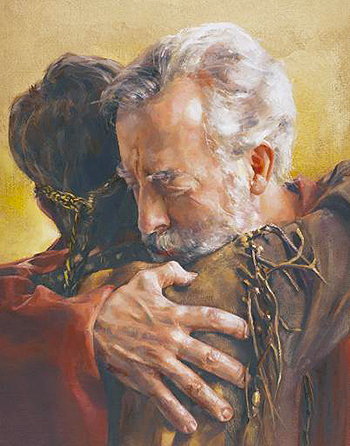Review: In Part One, we briefly examined the context of Isaiah 30 and summarized the main points. In Part Two, covering Isaiah 30:1-9, we discussed the subtle ways the enemy of our souls deceives us into devoting our hearts to idols, rather than the One True God, the Maker of heaven and earth. In Part Three, we will examine verses 10-17, which explain one reason why God sometimes must wait to help us.
And therefore the Lord [earnestly] waits [expecting, looking, and longing] to be gracious to you; and therefore He lifts Himself up, that He may have mercy on you and show loving-kindness to you. For the Lord is a God of justice.
Blessed (happy, fortunate, to be envied) are all those who [earnestly] wait for Him, who expect and look and long for Him [for His victory, His favor, His love, His peace, His joy, and His matchless, unbroken companionship]! (Isaiah 30:18, AMPC)
Idol worship is subtle. In verses 1 through 9 we learned, through seeing what God said about Israel’s actions, that when we do not trust God and instead trust something or someone else and take action based on trusting that thing or that person, we are guilty of idol worship. This is rebellion against God because we are not hearing—which is to say, not doing—the things He says we are to do. One thing He says do is
trust Him and obey Him and
depend on Him to provide and deliver.
You may think: “I am not rebelling against God in anything. I am doing what I should do.” I hope that is true. However, it is valuable to remember that we all rebel in many ways. We rebel when:&ehk=dJEg3IHUrLAMfTDasovVlckTTv9Xcvd4hrzV%2fHSvqmg%3d&risl=&pid=ImgRaw&r=0)
- We do something He says do not do, like when we show favoritism by avoiding the hard-to-love people God puts in our path. See James 2.
- We fail to do something He says to do, like when we neglect prayer and Bible study. God says to “Love the LORD your God with all your heart and with all your soul and with all your strength.” (Deuteronomy 6:5, NIV). What would your spouse or friends think if you did not speak with them for a day or week even though they were with you all that time? Or what if you did not read the letters they wrote while away for three months?
Our conduct shows in whom, or what, we trust. This thing about who we trust is as subtle as a razor is sharp. It is potentially dangerous spiritually. The enemy is always seeking ways to steal our love and obedience to God, so we need to ask God to search our hearts (Psalm 139:23-24). We also need to examine ourselves regularly (2 Corinthians 13:5). One way to do that is to consider what we are doing. We reveal who we trust by our conduct, by what we do, just like Israel in Isaiah 30. When Israel purchased help from Egypt, they showed they refused to trust God and wait for Him.
How might idol worship look today?
- If I spend my entire paycheck on bills instead of paying my tithes and offerings first, I am trusting my money. I am rebelling against God by refusing to trust Him to take care of me.
- If I fill each hour of every day with noise or other people and avoid time alone with God, so that I can give Him my total attention, I am not trusting God to be my companion.
- If I say there is not enough time for daily devotions, I am failing to trust that God is sovereign over time. I am trusting in myself and I am, by my actions, saying that whatever I did that day is more important to me than God.
- If I say I just cannot understand when I study the Bible for myself so I’ll listen to others teach and preach, I am disobeying God’s command to study His Word. I am failing to trust that God Himself can teach me. I am also accusing Him of being unfair because my actions say I believe He has told me to do something that is beyond my abilities.
 Isaiah 30:10-11. Now consider verses 10 through 11.
Isaiah 30:10-11. Now consider verses 10 through 11.
Who [virtually] say to the seers [by their conduct], See not! and to the prophets, Prophesy not to us what is right! Speak to us smooth things, prophesy deceitful illusions. Get out of the true way, turn aside out of the path, cease holding up before us the Holy One of Israel. (emphasis added)
God says very clearly that Israel rejected him by the things they did, by depending on Egypt for help. Their actions were saying they did not want to hear about the Holy One of Israel and His ways, one of which is for His people to trust Him to be their Shield and Defender (Deuteronomy 31:6, Psalm 18:2, Psalm 91, Psalm 34:7 and on and on.)
Isaiah 30:12-14. In the next three verses, God explains why disaster will overtake them.
12 Therefore thus says the Holy One of Israel: Because you despise and spurn this [My] word and trust in cunning and oppression, in crookedness and perverseness, and rely on them,
13 Therefore this iniquity and guilt will be to you like a broken section of a high wall, bulging out and ready [at some distant day] to fall, whose crash will [then] come suddenly and swiftly, in an instant.
14 And he shall break it as a potter’s vessel is broken, breaking it in pieces without sparing so that there cannot be found among its pieces one large enough to carry coals of fire from the hearth or to dip water out of the cistern. (emphasis added)
In Verse 12 God just does not say “Therefore”, which means for the reasons that came before, He also restates the reasons. He says to Israel . . . because you despised and spurned My Word and showed by your actions that you trusted your own perverse way of depending on Egypt to save you. . .
Then God says “therefore” again. That makes three times God is emphasizing to Israel that disaster is coming because of their actions. God “does not willingly and from His heart afflict or grieve the children of men.: (Lamentations 3:33, AMPC). God is compassionate, full of loving kindness and tender mercy. But God is also just and fair. That means our actions must have consequences.
God tells Israel that their sin and guilt will be to them like a bulging wall that will suddenly collapse. The collapse will be shattering, leaving not one useful thing left.
Isaiah 30:15-17:
15 For thus said the Lord God, the Holy One of Israel: In returning [to Me] and resting [in Me] you shall be saved; in quietness and in [trusting] confidence shall be your strength. But you would not,” (emphasis added)
In verse 15, God again emphasizes to Israel that it is their sin of refusal to follow His instructions which will bring calamity upon them. God links verses 1 through 14 with verse 15 with that word “For.” God says that verses 1 through 14 will happen because (or for) I told you that you would be saved when you return and rest in me. I told you that you would find strength when you were quiet and had trusting confidence in me. But you would not obey Me!
Verses 16 and 17 continue God’s explanation to Israel about why they will fall into calamity.
16 And you said, No! We will speed [our own course] on horses! Therefore you will speed [in flight from your enemies]! You said, We will ride upon swift steeds [doing our own way]! Therefore will they who pursue you be swift, [so swift that]
17 One thousand of you will flee at the threat of one of them; at the threat of five you will flee till you are left like a beacon or a flagpole on the top of a mountain, and like a signal on a hill. (emphasis added)
God says “And”, meaning not only did you refuse to trust in Me but you said you would swiftly escape from your enemy by doing things your own way. So because of that, your enemies will be swift, so swift that they will terrorize you and make you flee in utter panic until you are left totally helpless.
 Rebellion—idol worship–takes many forms. As we walk with God, He requires more of us and rebellion, which is to say idol worship, becomes harder to detect. It is easy to let our desires—which we can inaccurately perceive as needs—deceive us into putting something before God.
Rebellion—idol worship–takes many forms. As we walk with God, He requires more of us and rebellion, which is to say idol worship, becomes harder to detect. It is easy to let our desires—which we can inaccurately perceive as needs—deceive us into putting something before God.
A personal example: Over the years I’ve walked with God He has cleansed me of many sinful habits and attitudes and replaced them with godly behaviors and attitudes. The last few years, in an effort to avoid eye strain, I often listen to rather than read the Bible and other books. Recently, I discovered an author I liked who was an excellent writer. Listening to him was not only pleasurable but, as a writer, it was instructive. I listened to one book and was delighted to see he had written ten others and was still writing. There was a bit of profanity but not much. However, in the next book he introduced a character with consistently profane language.
I confess that for a while, I kept listening, in spite of doubts, because I was subconsciously reasoning that I needed to hear good examples of writing. I knew Romans 14:23 specifically teaches that if we do something we have doubts about, we are sinning. Yet, I kept listening, ignoring that little guilty feeling inside. Thanks be to God that did not last long, I repented, with many tears.
For about a week, I found no audio books that I enjoyed and that were clean. Why? In the last ten years I had foraged in my library’s audio book catalog and found that most were uninteresting to me, poorly written, or else had profanity and sex scenes or witchcraft or something else that set off alarm bells. So, after deleting that novel with the vile language, I started on some of the books I had already heard four or five times. Then, one evening, quite by accident (ha!) I discovered two new authors and one I had forgotten about who were better writers than the one I had given up.
Everything I have ever given up for the purpose of honoring God has been replaced with something far, far better. Every time, for over forty years. Oh, how good God is!
In Part Four we will examine verse 18, which vividly describes what God is earnestly doing as He watches us and waits for us to return to Him.
 And therefore the Lord [earnestly] waits [expecting, looking, and longing] to be gracious to you; and therefore He lifts Himself up, that He may have mercy on you and show loving-kindness to you. For the Lord is a God of justice.
And therefore the Lord [earnestly] waits [expecting, looking, and longing] to be gracious to you; and therefore He lifts Himself up, that He may have mercy on you and show loving-kindness to you. For the Lord is a God of justice.
Blessed (happy, fortunate, to be envied) are all those who [earnestly] wait for Him, who expect and look and long for Him [for His victory, His favor, His love, His peace, His joy, and His matchless, unbroken companionship]! (Isaiah 30:18, AMPC)
 Webster’s then quotes “Little children, keep yourselves from idols (1 John 5:1)” and further states “An idol is anything which usurps the place of God in the hearts of his rational creatures.” (Can you see why this is an excellent dictionary to use for your Bible study?)
Webster’s then quotes “Little children, keep yourselves from idols (1 John 5:1)” and further states “An idol is anything which usurps the place of God in the hearts of his rational creatures.” (Can you see why this is an excellent dictionary to use for your Bible study?)
 Woe to the rebellious children, says the Lord, who take counsel and carry out a plan, but not Mine, and who make a league and pour out a drink offering, but not of My Spirit, thus adding sin to sin; Who set out to go down into Egypt, and have not asked Me—to flee to the stronghold of Pharaoh and to strengthen themselves in his strength and to trust in the shadow of Egypt!
Woe to the rebellious children, says the Lord, who take counsel and carry out a plan, but not Mine, and who make a league and pour out a drink offering, but not of My Spirit, thus adding sin to sin; Who set out to go down into Egypt, and have not asked Me—to flee to the stronghold of Pharaoh and to strengthen themselves in his strength and to trust in the shadow of Egypt! Wicked King Ahaz, as other kings had done, took the treasures of the Temple and the palace, loaded them on camels and donkeys and sent them across the desert to buy help from Egypt. The Enduring Word commentary observes that Isaiah felt sorry for the beasts of burden because they were carrying such heavy loads of treasures across the fiercely hot and dangerous dessert and it was all for nothing – because the help of Egypt was worthless and would do no good.
Wicked King Ahaz, as other kings had done, took the treasures of the Temple and the palace, loaded them on camels and donkeys and sent them across the desert to buy help from Egypt. The Enduring Word commentary observes that Isaiah felt sorry for the beasts of burden because they were carrying such heavy loads of treasures across the fiercely hot and dangerous dessert and it was all for nothing – because the help of Egypt was worthless and would do no good.